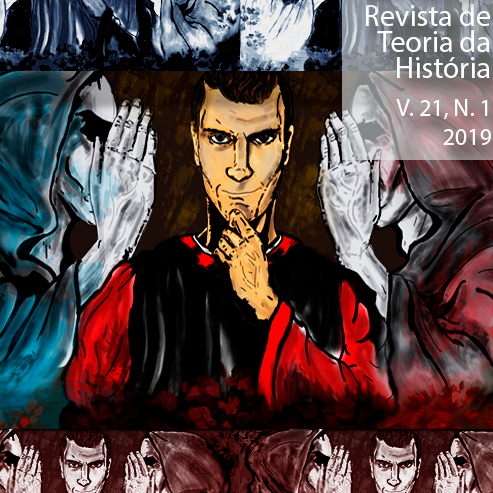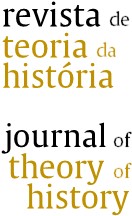O O POVO E A REPÚBLICA: UM ESTUDO SOBRE SALÚSTIO E O CONFLITO POLÍTICO NO REPUBLICANISMO ROMANO
Palabras clave:
Roma, Republicanismo, Democracia, Conflito, História do Pensamento PolíticoResumen
Pretendo neste artigo mobilizar recentes abordagens sobre democracia e participação popular no âmbito da Teoria Política e da História do Pensamento Político. Orientado por questões teóricas contemporâneas, analiso textos de um escritor clássico do republicanismo, Salústio, enfatizando suas visões sobre o conflito político. Pretendo demonstrar que Salústio não possui uma visão essencialista sobre o conflito político e que suas assertivas somente podem ser adequadamente compreendidas se ambientadas no contexto de uma constituição mista. Inicio discutindo o movimento nomeado republican revival, especialmente no que concerne aos mais recentes estudos sobre a realidade da antiga república romana. Em seguida, considero temas do debate sobre o elemento popular entre teóricos contemporâneos da política. Finalmente, examino os escritos de Salústio, investigando suas considerações sobre o conflito político e considerando a relevância de suas considerações para os esforços dos teóricos contemporâneos em compreender o papel do povo, e do conflito, no âmbito da política.
Citas
ALLEN Jr., Walter. "Sallust's Political Carrer". Studies in Philology. 51(1): 1-14, 1954.
BERLIN, Isaiah. “Two conceps of liberty”. In BERLIN, Isaiah. Four essays on liberty. Oxford: Oxford University Press, 1969.
CICERO. The Republic; The Laws. (Translated by Clinton W. Keyes) Cambridge, London: Harvard University Press, 1928.
EARL, D. C. The Political Thought of Sallust. Cambridge: Cambridge University Press, 1961.
EVRIGENIS, Ionnis D. Fear of Enemies and Collective Action. New York: Cambridge University Press, 2008.
FONTANA, Benedetto. “Sallust and the politics of Machiavelli”. History of Political Thought. 24 (1): 86-108, 2003.
HAMMER, Dean. Roman Political Thought: from Cicero to Augustine. Cambridge: Cambridge University Press, 2014.
KAPUST, Daniel. “Skinner, Pettit e Livy: the conflict of the orders and the ambiguity of republican liberty”.History of Political Thought. 25 (3): 378-401, 2004.
KAPUST, Daniel. Republicanism, Rhetoric and Roman Political Thought: Sallust, Livy, and Tacitus. New York: Cambridge University Press, 2011.
KAPUST, Daniel J.;TURNER, Brandon P. “Democratical Gentlemenand the Lust for Mastery:Status, Ambition, and the Language of Liberty in Hobbes’s Political Thought”.Political Theory.41:648-675, 2013.
KENNEY, E. J., CLAUSEN, W. V. “Sallust”. In: KENNEY, E. J., CLAUSEN, W. V. The Cambridge History of Classical Literature. Cambridge University Press. pp. 268-280, 2013.
KENNEDY, Geof. (2014), "Cicero, Roman Republicanism and the Contested Meaning of Libertas". Political Studies. 62 (3): 488-501, 2014.
LINTOT, Andrew. The Constitution of the Roman Republic. Oxford: Oxford University Press, 1999.
MCCORMICK, John. “Machiavellian Democracy: Controling Elites with Ferocious Populism”. American Political Science Review, 95(2):297-313, 2001.
MCCORMICK, John. Machiavelli against Republicanism: on the Cambridge School’s ‘Guicciardini’ Moments.” Political Theory, 31(5):615-43, 2003.
MCCORMICK, John. Machiavellian Democracy. New York: Cambridge University Press, 20011.
MCCORMICK, John. "Machiavellian Democracy in the Good Society." The Good Society. 21(1): 90-117, 2012.PETIT, Eugène. Tratado Elementar de Direito Romano. (Tradução de Jorge Luís Custódio Porto) Campinas: Russel Editores, 2003.
PETTIT, Philip. Republicanism: A Theory of Freedom and Government. Oxford: Oxford University Press, 1997.
PETTIT, Philip. On the people’s terms: a republican theory and model of democracy. New York: Cambridge University Press, 2012.
PETTIT, Philip. (2013), Two Republican Traditions. in: NIEDERBERGER, Andreas; SCHINK, Philipp. (eds.) Republican Democracy: liberty, law and politics. Edinburgh:Edinburgh University Press, 2013. (169-204).
POCOCK, J. G. A. The Maquiavellian moment -Florentine political thought and the Atlantic republican tradition. Princeton, NJ: Princeton University Press, 2003.
POLYBIUS. The Histories. (Translated by Robin Waterfield) Oxford: Oxford University Press, 2010.SALLUST. The Histories. (Translated by P. McGushin) Vol I. Oxford: Claredon Press, 1992.
SALLUST. “The war with Catiline”. (Translated by J. C. Rolfe) in: Sallust. Cambridge: Harvard University Press, 1931.
SALLUST. “The war with Jugurtha”. (Translated by J. C. Rolfe) in: Sallust. Cambridge: Harvard University Press, 1931.
SKINNER, Quentin. The foundations of modern politica thought. Cambridge; New York: Cambridge University Press, 1978.
SKINNER, Quentin. “The Paradoxes of Political Liberty”. The Tanner Lectures on Human Values. Harvard University, 1984.
SKINNER, Quentin. Liberty before liberalism. Cambridge; New York: Cambridge University Press, 1988.
SKINNER, Quentin. “A third concept of liberty”. Proceedings of the British Academy117, pp. 237-68, 2002.
SYME, Ronald. Sallust. Berkeley: University of California Press, 1964.
URBINATI, Nadia. “Competing for Liberty: the republican critique of democracy”, American Political Science Review, 106(3): 607-621, 2012.
URBINATI, Nadia. “Republicanism: democratic or popular?”, The Good Society, 20(2): 157-169, 2011.
URBINATI, Nadia. Democracy Disfigured -opinion, truth, and the people. Cambridge, Massachutes; London, England: Harvard University Press, 2014.
WALKER, Willian. “Sallust and Skinner on Civil Liberty”, European Journal of Political Theory, 5(3) 237–259, 2006.
WOOD, Neal. “Sallust’s Theorem: A Comment on ‘Fear’ in Western Political Thought.” History of Political Thought. 26(2):174-189, 1995.
Descargas
Publicado
Cómo citar
Número
Sección
Licencia
A Revista publica única e exclusivamente artigos inéditos. São reservados à Revista todos os direitos de veiculação e publicação dos artigos presentes no periódico.
Licensed under a Creative Commons Attribution-NonCommercial-NoDerivatives 4.0 International License



